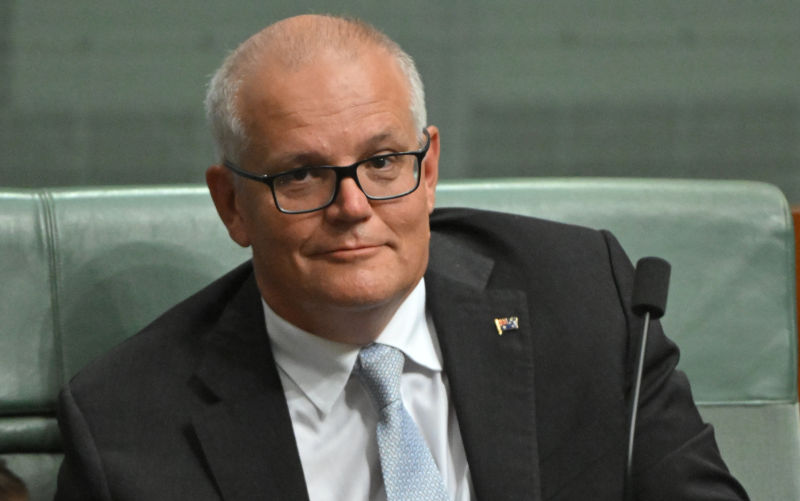In focusing on Scott Morrison’s shocking record in government, and/or on his pathetic and self-pitying response to Commissioner Holmes’ Robodebt report, we must not lose sight of the fact that Morrison is symptomatic of a great deal of what is so terribly wrong in contemporary Australian politics. He is not the cause of what is wrong. The focus on Morrison is deflecting attention away from the increasingly worrying conduct of the Albanese government and the alarming rate at which Australia is being entrapped into American militarism in the region.
Scott Morrison’s egregious response to the Robodebt Royal Commission’s findings against him has angered many Australians, including even a few Opposition MPs and some remaining members of the Liberal Party. His stubborn refusal to leave the parliament – possibly because he has no offers of work outside it – means he will remain, for the time being at least, a small but nasty canker on the Australian body politic. It is important, however, not to over-state the abject failings of this man.
There is no doubt the Morrison government will go down in history as one of the worst – if not the worst – governments endured by this country. As a minister in the Abbott and Turnbull governments, and then as Prime Minister, Morrison behaved like a self-interested oaf and bully. He certainly can’t be viewed as a principled political leader.
Likewise with many of his ministers. For example, Josh Frydenberg’s profligate squandering of many millions of dollars on large companies under the guise of his JobKeeper policy, or his arrogant dismissal of Victoria’s Covid policies are two of the more obviously bad items, among many, on his watch as Treasurer. We must add to this the questionable actions of the likes of Barnaby Joyce, Angus Taylor, Sussan Leys, Peter Dutton, and others, whose actions in government must be thoroughly investigated, possibly by the NACC.
However, in focusing only on Morrison’s shocking record in government, and/or on his pathetic and self-pitying response to Commissioner Holmes’ report, we must not lose sight of the fact that he is symptomatic of a great deal of what is so terribly wrong in contemporary Australian politics. He is not the cause of what is wrong.
What is wrong goes back over most post-war governments in Australia, with the possible exception of the Whitlam era. While the Hawke-Keating governments achieved some impressive reforms (for example a national superannuation scheme), its obsession with the neoliberal attack on crucial public goods – remember, for example, the myopic and ideologically-driven privatisation of the Commonwealth Bank and QANTAS – systematically undermined its mostly, but by no means completely laudable policy record. Add to this its short-sighted media regulatory “reforms” that have allowed the Murdoch mob to gain an effective monopoly of Australia’s media.
Nor did Hake and Keating do enough to lift the standard of debate in the snarling bull pit that parliament has become accustomed to, and the manner in which political debates are conducted across contemporary Australia. These failings of the Hawke-Keating era laid the foundations of what was to come after it. From the time of the Howard government, Australian politics have declined precipitously. Policy debates are conducted largely in ideological terms, often (always?) dictated by the hacks at News Limited’s various outlets.
As Prime Minister, Howard appeared to be a reincarnation of the lamentable Billy Hughes. His style recalled much of the nastiness, small-mindedness, lack of political vision, racism, vindictiveness, and pro-monarchy sentimentality that had characterised Hughes’ long and divisive years in the Australian parliament. Howard set in motion the movement of the Liberal Party to become a very right wing party, abandoning the centre of the Australian political continuum. This move has been aided and abetted by extremist religious, evangelical backers who have facilitated the careers of Stuart Robert, Scott Morrison, Alex Hawke, and even less religious Liberals like Peter Dutton in the Australian parliament.
In policy terms, the Howard years cemented the Australian economy into a neoliberal future, privatising a wide range of public goods (for example, aged care) while moving Australia into a closer engagement with United States militarism across the globe. The result has had negative consequences for the Australian economy (low wages, low productivity, and rapidly growing inequality across the country). And it has entrenched Australia on a foreign and defence policy course resulting in China being perceived as a dangerous threat and America as the country’s saviour from that threat – a perceived threat and pro-US policy response that have become the hallmark of the Albanese-Marles government of today.
While Tony Abbott was without question the most ham-fisted Liberal politician in the Hughes-Howard tradition, Scott Morrison was its apotheosis. He successfully isolated moderate Liberals from the centre of his government. Their supine acceptance of that isolation gave him free rein to engage in some of the most secretive and possibly corrupt behavior of any prime minister in the country’s history. His clandestine assumption of several ministerial positions is arguably the most blatant example of political subterfuge ever seen in federal politics in Australia. There are many others which historians will no doubt ponder as they research his time as prime minister.
However, the Robodebt Royal Commission report has shone a glaring spotlight on Morrison’s conduct, first as a minister in charge of overseeing much of that woeful policy’s architecture, and secondly it highlights the kind of politician that he is. There is widespread agreement, certainly among balanced commentators on the policy (for example, the excellent Laura Tingle), that it represents one of the worst policies ever imposed on the Australia people. Moreover, it is possibly an example of governmental malfeasance – that is, neglective or wilful conduct by a public official or officials (see Mark Aaronson, “Malfeasance in Public Office,” Melbourne University Law Review, Vol. 35, no. 1, 2011: 1-49).
Nonetheless, if the debates swirling around Morrison and his cohort in government turn out to be the be-all-and-end-all of the conversation about what was wrong with, and them, we shall lose sight of a much larger problem bedevilling the conduct of Australian politics today. It is certainly the case that Morrison and others have much to answer for. The Holmes’ report and what may yet come out of NACC investigations have answered, or will answer, many if not all of those questions. And it is also certain that there must be dire consequences for anyone whose policies and political conduct are found to be malfeasant or otherwise detrimental to the health of the body politic in Australia. Nothing less than a prison term should be on the cards for any perpetrators if they are found guilty of any crimes.
But the worrying thing about all this is that the focus on Morrison is deflecting attention away from the increasingly worrying conduct of the Albanese government. The recent AUSMIN meeting in Brisbane has demonstrated the alarming rate at which Australia is being entrapped into American militarism in the region. The lack of a visionary response by Albanese, not only to the Morrison era, but to the whole Hughes-Howard tradition of morally backward politics in contemporary Australia, is deeply concerning.
Dr Allan Patience is an honorary fellow in political science in the University of Melbourne.

